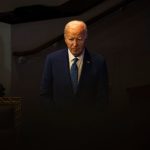In the wake of the recent NATO summit, President Joe Biden’s aging and demeanor have become subjects of scrutiny amongst political analysts and the public alike. As the oldest person ever elected to the presidency at the age of 78, questions have arisen regarding his physical and mental fitness to lead the nation effectively. The summit, which took place in Brussels, Belgium, brought together world leaders to discuss crucial matters of global security and cooperation. However, it was Biden’s interactions and overall demeanor during the event that sparked debates and raised concerns.
Observers noted that President Biden appeared fatigued and at times struggled to maintain strong posture and engage in conversations with other leaders. His gait seemed slightly unsteady, and his speech was occasionally hesitant, with noticeable pauses and verbal fumbles. These observations have led to renewed discussions about the impact of aging on the presidency and whether Biden’s advanced age is affecting his ability to carry out his duties effectively.
While many have expressed concern about Biden’s physical and mental acuity, others argue that his experience and leadership qualities are more crucial than his age. President Biden’s long political career, including his time as Vice President under Barack Obama, has equipped him with the knowledge and perspective necessary to navigate complex international relations. Proponents of the President emphasize his diplomatic skills and commitment to restoring America’s reputation on the world stage after the tumultuous Trump era.
However, the issue of age in politics is a delicate one, especially when it comes to the highest office in the land. The presidency is an incredibly demanding role that requires constant decision-making, stamina, and mental acuity. As the leader of the free world, the President’s every word and action are scrutinized and analyzed both domestically and globally. Therefore, concerns about Biden’s aging and demeanor are not unwarranted, as they impact not just his personal well-being but also have implications for the country’s stability and security.
In response to criticisms about his age and demeanor, President Biden and his administration have maintained that he is in good health and fully capable of fulfilling his duties. Regular check-ups with medical professionals and a commitment to maintaining a healthy lifestyle are cited as evidence of Biden’s fitness for office. Additionally, the President’s inner circle is said to provide support and guidance to ensure that he is equipped to handle the demands of the presidency effectively.
Moving forward, as President Biden continues to navigate the complexities of international diplomacy and domestic policy, the scrutiny surrounding his aging and demeanor is likely to persist. Ultimately, it is up to the American public and political observers to weigh the President’s experience and leadership qualities against concerns about his physical and mental capabilities. The debates sparked by Biden’s performance at the NATO summit reflect broader discussions about age, health, and leadership in modern politics, highlighting the need for transparency and accountability in assessing the fitness of our leaders.



